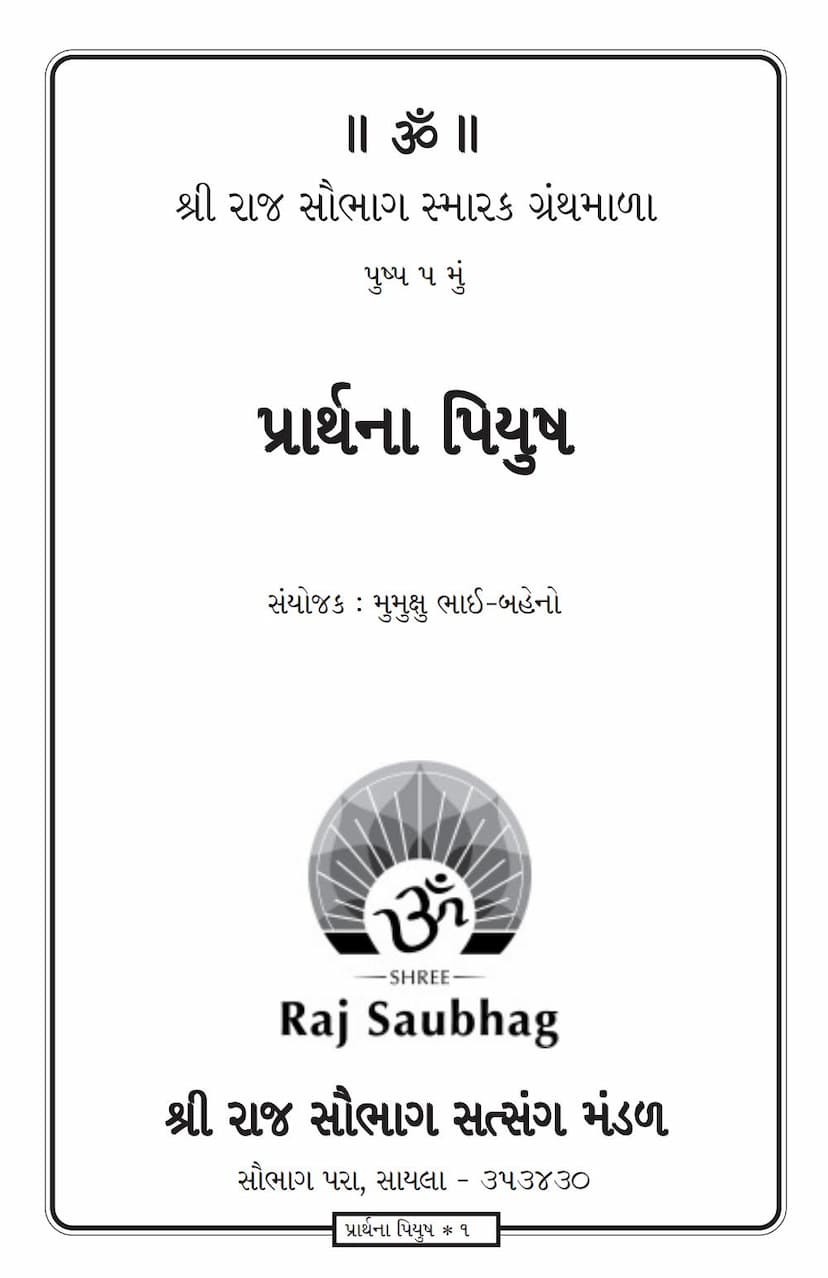Prathna Piyush
Added to library: September 2, 2025

Summary
Here's a comprehensive summary of the Jain text "Prarthna Piyush" based on the provided pages:
Book Title: Prarthna Piyush (Prayer Nectar) Author(s): Raj Saubhag Satsang Mandal Publisher: Raj Saubhag Satsang Mandal Catalog Link: https://jainqq.org/explore/009212/1
Overview:
"Prarthna Piyush" is a collection of devotional hymns, prayers, and philosophical verses compiled by the Raj Saubhag Satsang Mandal. The book is presented as the fifth "flower" in a series of publications aimed at guiding spiritual seekers (mumukshu) towards self-realization and liberation. The primary goal is to provide a spiritual "fare" for those aspiring to become "adhikari" (qualified) on the path of Jainism, fostering detachment, equanimity, and ultimately, the realization of the soul's true nature.
Key Themes and Content:
The book is structured into various sections, each focusing on different aspects of Jain spirituality and devotion. The core themes revolve around:
- Guru Devotion: The paramount importance of the Sadguru (True Guru) is emphasized throughout the text. The verses highlight that without the Guru's guidance and grace, understanding the essence of Jin (Tirthankara) and the true path is impossible. The Guru is seen as the means to liberation and the source of true knowledge.
- The Nature of the Soul and Reality: The text delves into the distinction between the soul (Jad) and consciousness (Chaitanya), the eternal nature of the soul, its role as the doer and experiencer, and the ultimate goal of Moksha (liberation). It contrasts worldly attachments with the pursuit of the soul's true form.
- Spiritual Practice and Sadhana: Various spiritual practices are mentioned, including prayer, meditation, contemplation, devotion to the Jinas, and adherence to the teachings of the Tirthankaras. The importance of "Agya Bhakti" (devotion through obedience to the Guru's commands) is highlighted as a crucial means to achieve spiritual progress.
- Understanding Jain Philosophy: Key Jain principles are explained, such as the nine Tattvas (essences), six Padarathas (substances), and the path of the Vitarag (detached ones). The text aims to clarify complex philosophical concepts for the common seeker.
- Overcoming Obstacles: The book addresses common obstacles faced by spiritual aspirants, such as ego, attachment, delusion, and the influence of worldly desires. It emphasizes the need for introspection, self-awareness, and the eradication of inner impurities (kashayas).
- The Six Pillars of Right Faith (Shraavak Guno): A significant portion of the text (pages 13-17) is dedicated to explaining the six fundamental tenets of right faith (Samyak Darshan), which are:
- The Soul Exists (Aatma Chhe): Affirming the reality of the soul as a distinct entity.
- The Soul is Eternal (Aatma Nitya Chhe): The soul is without beginning or end, unchanging in its essential nature.
- The Soul is the Doer (Aatma Karta Chhe): The soul performs actions and experiences their consequences.
- The Soul is the Experiencer (Aatma Bhokta Chhe): The soul is the one who enjoys or suffers the fruits of its actions.
- Moksha is Attainable (Moksha Pad Chhe): Liberation from the cycle of birth and death is a real possibility.
- Moksha is Attainable through a Path (Moksha no Upay Chhe): There are specific means and practices to achieve liberation.
- The Path of the Vitarag: The text extols the path shown by the Vitarag Purushas (Tirthankaras) as the ultimate remedy for worldly suffering, emphasizing truth, compassion, and detachment.
- Morning and Evening Prayers: Specific verses are dedicated to morning and evening prayers, offering a framework for daily spiritual reflection and devotion.
- Praise of the Jinas and Gurus: The book is replete with hymns and stanzas praising the Tirthankaras and the lineage of Gurus, acknowledging their role in guiding humanity.
- The Importance of Contemplation and Reflection: The text encourages deep contemplation ("Nididhyasana") of the verses to gain true understanding and spiritual merit.
Purpose and Message:
The overarching message of "Prarthna Piyush" is to guide individuals on their spiritual journey towards self-realization and ultimate liberation. It emphasizes that true happiness and freedom come from understanding and embodying the teachings of the Jain Tirthankaras, with the Guru as the indispensable guide. The collection serves as a devotional companion, a source of philosophical clarity, and an inspiration for living a life of purity, detachment, and spiritual pursuit.
The preface mentions that the book is a result of the "punyayoga" (auspicious karma) of the mumukshu brothers and sisters, who provided financial assistance. It also includes a disclaimer requesting correction of any printing errors due to human limitations.
In essence, "Prarthna Piyush" is a devotional compilation that aims to enrich the spiritual life of its readers by offering guidance, inspiration, and a deeper understanding of Jain principles, all centered around devotion to the Guru and the pursuit of the soul's true, liberated state.